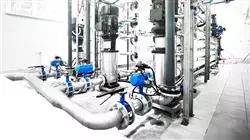University certificate
The world's largest faculty of information technology”
Introduction to the Program
Learn in depth about Advanced CFD Techniques, thanks to the best online university in the world according to Forbes, thanks to TECH Global University"

Computational fluid dynamics (CFD) is a simulation tool used in a variety of fields, from aerospace to energy and civil engineering. Advanced CFD techniques enable computer scientists, engineers and computer scientists to simulate and analyze complex situations, resulting in a better understanding of physical phenomena and more efficient system design.
For this reason, TECH Global University has designed a University Postgraduate certificate in Advanced CFD Techniques to provide students with the necessary skills and competencies to be able to perform their work as specialists with the highest possible efficiency and quality. Thus, throughout this program, aspects such as Post-processing, Shape Functions, Development of Boundary Conditions, Molecular Equilibrium and Modeling will be addressed.
All this, through a convenient 100% online modality that allows students to organize their schedules and studies, combining them with their other Obligation. In addition, this degree has the most Dynamic theoretical and practical materials on the market, which facilitates the student's study process and allows them to achieve their objectives quickly and complete.
Become an expert in DSMC Method Applicability in only 6 weeks and with total freedom of organization"
This Postgraduate certificate in Course in Advanced CFD Techniques contains the most complete and up-to-date educational program on the market. Its most outstanding features are:
- The development of case studies presented by experts in Advanced CFD Techniques
- The graphic, schematic and practical contents of the program provide Rehabilitation and practical information on those disciplines that are essential for professional practice
- Practical exercises where self-assessment can be used to improve learning
- Its special emphasis on innovative methodologies
- Theoretical lessons, questions to the expert, debate forums on controversial topics, and individual reflection assignments
- Content that is accessible from any fixed or portable device with an Internet connection
Access all content on Molecular Equilibrium, Supersonic Corner and LBM from your tablet, mobile or computer at any time of the day"
The program’s teaching staff includes professionals from the sector who contribute their work experience to this educational program, as well as renowned specialists from leading societies and prestigious universities.
Its multimedia content, developed with the latest educational technology, will provide the professional with situated and contextual learning, i.e., a simulated environment that will provide an immersive education programmed to learn in real situations.
The design of this program focuses on Problem-Based Learning, by means of which the professional must try to solve the different professional practice situations that are presented throughout the academic course. For this purpose, the student will be assisted by an innovative interactive video system created by renowned experts.
Enhance the maximum, the your professional profile in one of the most promising areas of the IT sector, thanks to TECH Global University and the most innovative materials and practice of"

Enroll now and delve into Experimentation with various Collision Operators from the comfort of your home and at any time of the day"
Why study at TECH?
TECH is the world’s largest online university. With an impressive catalog of more than 14,000 university programs available in 11 languages, it is positioned as a leader in employability, with a 99% job placement rate. In addition, it relies on an enormous faculty of more than 6,000 professors of the highest international renown.

Study at the world's largest online university and guarantee your professional success. The future starts at TECH”
The world’s best online university according to FORBES
The prestigious Forbes magazine, specialized in business and finance, has highlighted TECH as “the world's best online university” This is what they have recently stated in an article in their digital edition in which they echo the success story of this institution, “thanks to the academic offer it provides, the selection of its teaching staff, and an innovative learning method aimed at educating the professionals of the future”
A revolutionary study method, a cutting-edge faculty and a practical focus: the key to TECH's success.
The most complete study plans on the university scene
TECH offers the most complete study plans on the university scene, with syllabuses that cover fundamental concepts and, at the same time, the main scientific advances in their specific scientific areas. In addition, these programs are continuously being updated to guarantee students the academic vanguard and the most in-demand professional skills. In this way, the university's qualifications provide its graduates with a significant advantage to propel their careers to success.
TECH offers the most comprehensive and intensive study plans on the current university scene.
A world-class teaching staff
TECH's teaching staff is made up of more than 6,000 professors with the highest international recognition. Professors, researchers and top executives of multinational companies, including Isaiah Covington, performance coach of the Boston Celtics; Magda Romanska, principal investigator at Harvard MetaLAB; Ignacio Wistumba, chairman of the department of translational molecular pathology at MD Anderson Cancer Center; and D.W. Pine, creative director of TIME magazine, among others.
Internationally renowned experts, specialized in different branches of Health, Technology, Communication and Business, form part of the TECH faculty.
A unique learning method
TECH is the first university to use Relearning in all its programs. It is the best online learning methodology, accredited with international teaching quality certifications, provided by prestigious educational agencies. In addition, this disruptive educational model is complemented with the “Case Method”, thereby setting up a unique online teaching strategy. Innovative teaching resources are also implemented, including detailed videos, infographics and interactive summaries.
TECH combines Relearning and the Case Method in all its university programs to guarantee excellent theoretical and practical learning, studying whenever and wherever you want.
The world's largest online university
TECH is the world’s largest online university. We are the largest educational institution, with the best and widest online educational catalog, one hundred percent online and covering the vast majority of areas of knowledge. We offer a large selection of our own degrees and accredited online undergraduate and postgraduate degrees. In total, more than 14,000 university degrees, in eleven different languages, make us the largest educational largest in the world.
TECH has the world's most extensive catalog of academic and official programs, available in more than 11 languages.
Google Premier Partner
The American technology giant has awarded TECH the Google Google Premier Partner badge. This award, which is only available to 3% of the world's companies, highlights the efficient, flexible and tailored experience that this university provides to students. The recognition as a Google Premier Partner not only accredits the maximum rigor, performance and investment in TECH's digital infrastructures, but also places this university as one of the world's leading technology companies.
Google has positioned TECH in the top 3% of the world's most important technology companies by awarding it its Google Premier Partner badge.
The official online university of the NBA
TECH is the official online university of the NBA. Thanks to our agreement with the biggest league in basketball, we offer our students exclusive university programs, as well as a wide variety of educational resources focused on the business of the league and other areas of the sports industry. Each program is made up of a uniquely designed syllabus and features exceptional guest hosts: professionals with a distinguished sports background who will offer their expertise on the most relevant topics.
TECH has been selected by the NBA, the world's top basketball league, as its official online university.
The top-rated university by its students
Students have positioned TECH as the world's top-rated university on the main review websites, with a highest rating of 4.9 out of 5, obtained from more than 1,000 reviews. These results consolidate TECH as the benchmark university institution at an international level, reflecting the excellence and positive impact of its educational model.” reflecting the excellence and positive impact of its educational model.”
TECH is the world’s top-rated university by its students.
Leaders in employability
TECH has managed to become the leading university in employability. 99% of its students obtain jobs in the academic field they have studied, within one year of completing any of the university's programs. A similar number achieve immediate career enhancement. All this thanks to a study methodology that bases its effectiveness on the acquisition of practical skills, which are absolutely necessary for professional development.
99% of TECH graduates find a job within a year of completing their studies.
Postgraduate Certificate in Course in Advanced CFD Techniques
Advanced CFD (Computational Fluid Dynamics) techniques are tools and methods to improve the numerical simulation of complex flows. These techniques are developed and applied through the use of mathematical models, algorithms and specialized software programs. At TECH Global University we have this specialized program designed to provide theoretical knowledge of research and development of mathematical models, numerical methods, algorithms and specialized software.
The development of these advanced CFD techniques involves research and development of mathematical models, numerical methods, algorithms and specialized software. Validation and verification are critical to ensure that the results are accurate and reliable, so experimental data and detailed numerical simulations are used to evaluate the performance of these techniques. Advanced CFD techniques are essential for the design and analysis of systems involving complex, high-speed fluids, and are widely used in industry, research and the development of new technologies. In our undergraduate course, you will learn the concepts of fluid simulation techniques for modeling and analyzing turbulent and boundary layer behavior in different systems and applications. It is an excellent choice for those who wish to acquire specialized skills and develop a successful career in this field.







